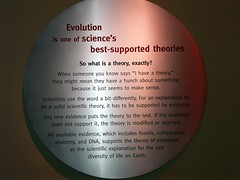 I was discussing the issue of uncertainty today with a colleague, specifically the uncertainty that surrounds predictions of future climate change, and the models that generate those predictions. My colleague is concerned that when scientists use the term "uncertainty" we convey to the non-scientist public that we don't know what we are talking about. He likened this to the use of the word "theory", and how detractors from the scientific method, such as advocates of Intelligent Design, exploit misunderstandings of scientific terms, or the specific meanings of various words in a scientifc context.
I was discussing the issue of uncertainty today with a colleague, specifically the uncertainty that surrounds predictions of future climate change, and the models that generate those predictions. My colleague is concerned that when scientists use the term "uncertainty" we convey to the non-scientist public that we don't know what we are talking about. He likened this to the use of the word "theory", and how detractors from the scientific method, such as advocates of Intelligent Design, exploit misunderstandings of scientific terms, or the specific meanings of various words in a scientifc context.
Well, let's explore this little issue. I will address "theory", and then deal with "uncertainty" in a later posting. What follows is a little blurb that I wrote almost two years ago as a supporting statement for the California Academy of Sciences' stance on evolution. But first let me point out two things:
- In science, there is no validity to the phrase "just a theory". A theory is IT! An idea doesn't get any better, is never rated any higher. To use that phrase is akin to saying "Jessie Owens won just gold medals". Until they begin to award platinum medals...
- Theories are objective, no beliefs necessary. When asked if I believe in evolution, I state flatly, NO. Evolution is an observation, not a belief. Darwin's Theory of Evolution by Natural Selection is the leading theory that explains evolution.
Some of the confusion that surrounds discussions of Evolution and other scientific concepts stems from the various meanings of the word theory. "Theory" has a very specific meaning in science that is distinct from its everyday common usage. The difference is best explained by outlining the stages of scientific investigation.
-
Scientific inquiry often begins with the formulation of an idea to explain an observation of the natural world. Such ideas are termed hypotheses, and they are equivalent to the non-scientific usage of "theory".
-
The goal of the modern scientific method is to formulate testable hypotheses, that is, ideas that can be tested directly by evidence and experimentation. Two important qualities of such tests are that they are:
-
Repeatable, meaning that other scientists can apply the tests objectively and independently, and
-
Verifiable, meaning that the results of the tests are consistent, regardless of who has conducted the tests.
-
-
Hypotheses may be subjected to many different tests by many different scientists. Often it is found that some part of the hypothesis is inconsistent with test results, in which case the hypothesis might have to be revised. In other instances, the hypothesis may be found to be wholly inconsistent with tests and observations, and it is rejected altogether. The result is that hypothesis testing is an ongoing process of formulation, testing, and revision.
-
When a hypothesis is found to be consistent, and holds up under extensive testing, then it is generally agreed that it represents a fundamental explanation of the observations that it was originally formulated for. In this case, the hypothesis-turned-fundamental concept is elevated to the status of a theory. It is important to note that in no case is a scientific theory free from further testing and revision, nor is it necessarily considered a sufficient explanation of the observations to the exclusion of additional testable scientific hypotheses.
Powered by ScribeFire.